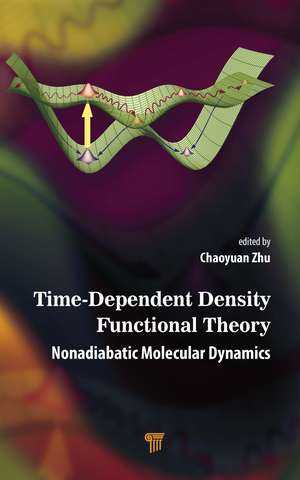Time-Dependent Density Functional Theory: Nonadiabatic Molecular Dynamics
Editat de Chaoyuan Zhuen Limba Engleză Hardback – 29 dec 2022
This book compiles and details cutting-edge research in quantum chemistry and chemical physics from interdisciplinary groups from Japan, China, South Korea, the United States, Hong Kong, and Taiwan. These groups are developing excited-state dynamics methods involving conical intersections and intersystem crossings for large complex systems. Edited by Chaoyuan Zhu, a prominent chemical physics researcher, this book will appeal to anyone involved in molecular dynamics and spectroscopy, photochemistry, biochemistry, and materials chemistry research.
Preț: 1131.42 lei
Preț vechi: 1379.77 lei
-18% Nou
Puncte Express: 1697
Preț estimativ în valută:
216.60€ • 222.88$ • 182.58£
216.60€ • 222.88$ • 182.58£
Carte tipărită la comandă
Livrare economică 01-15 martie
Preluare comenzi: 021 569.72.76
Specificații
ISBN-13: 9789814968423
ISBN-10: 9814968420
Pagini: 520
Ilustrații: 17 Tables, black and white; 80 Line drawings, color; 96 Line drawings, black and white; 11 Halftones, color; 91 Illustrations, color; 96 Illustrations, black and white
Dimensiuni: 152 x 229 x 29 mm
Greutate: 1.1 kg
Ediția:1
Editura: Jenny Stanford Publishing
Colecția Jenny Stanford Publishing
ISBN-10: 9814968420
Pagini: 520
Ilustrații: 17 Tables, black and white; 80 Line drawings, color; 96 Line drawings, black and white; 11 Halftones, color; 91 Illustrations, color; 96 Illustrations, black and white
Dimensiuni: 152 x 229 x 29 mm
Greutate: 1.1 kg
Ediția:1
Editura: Jenny Stanford Publishing
Colecția Jenny Stanford Publishing
Notă biografică
Chaoyuan Zhu obtained his first doctorate from the Institute of Nuclear Research, Academia Sinica, China, in 1990 and his second doctorate from the Institute for Molecular Science, Japan, in 1993. Currently he is a full professor in the Department of Applied Chemistry, National Chiao Tung University, Taiwan. Prof. Zhu has been working on theoretical chemistry method development and simulation for excited-state molecular dynamics and spectroscopy. His current interests are focused on simple and accurate semiclassical treatments for ab initio nonadiabatic molecular dynamic simulations with the use of time-dependent density functional theory.
Cuprins
1. Intersystem Crossing Reaction for Fluorescent 10-Methyl-9(10H)-Acridone via Dioxetanone Intermediates: On-the-Fly Nonadiabatic ONIOM Molecular Dynamics with Particle Mesh Ewald Method and Thermodynamics Simulations 2. On-the-Fly Excited-State Molecular Dynamics Study Based on Spin-Flip Time-Dependent Density Functional Theory Approach: Photo-Branching Reaction of Stilbene and Stilbene Derivatives 3. Nonadiabatic Dynamics Simulations on the Excited States of Carbon-Related Materials with Time-Dependent Density Functional Theory 4. Mixed-Reference Spin-Flip Time-Dependent Density Functional Theory as a Method of Choice for Nonadiabatic Molecular Dynamics 5. Conformationally Controlled Photochemistry Studied by Trajectory Surface Hopping 6. Generalized Trajectory-Based Surface-Hopping Nonadiabatic Dynamics with Time-Dependent Density Functional Theory: Methodologies and Applications 7. Multistate Nonadiabatic Molecular Dynamics: The Role of Conical Intersection between the Excited States 8. Excited Carrier Dynamics in Condensed Matter Systems Investigated by ab initio Nonadiabatic Molecular Dynamics 9. Time-Dependent Density Matrix Renormalization Group for Quantum Chemistry 10. Spin-Flip TDDFT for Photochemistry 11. Phase Space Mapping Theory for Nonadiabatic Quantum Molecular Dynamics 12. Global Switch Trajectory Surface Hopping Dynamics in the Framework of Time-Dependent Density Functional Theory
Descriere
This book compiles and details cutting-edge research in quantum chemistry and chemical physics from the interdisciplinary groups from Japan, China, South Korea, the United States, Hong Kong, and Taiwan. They are developing excited-state dynamics methods involving conical intersections and intersystem crossings for large complex systems.
